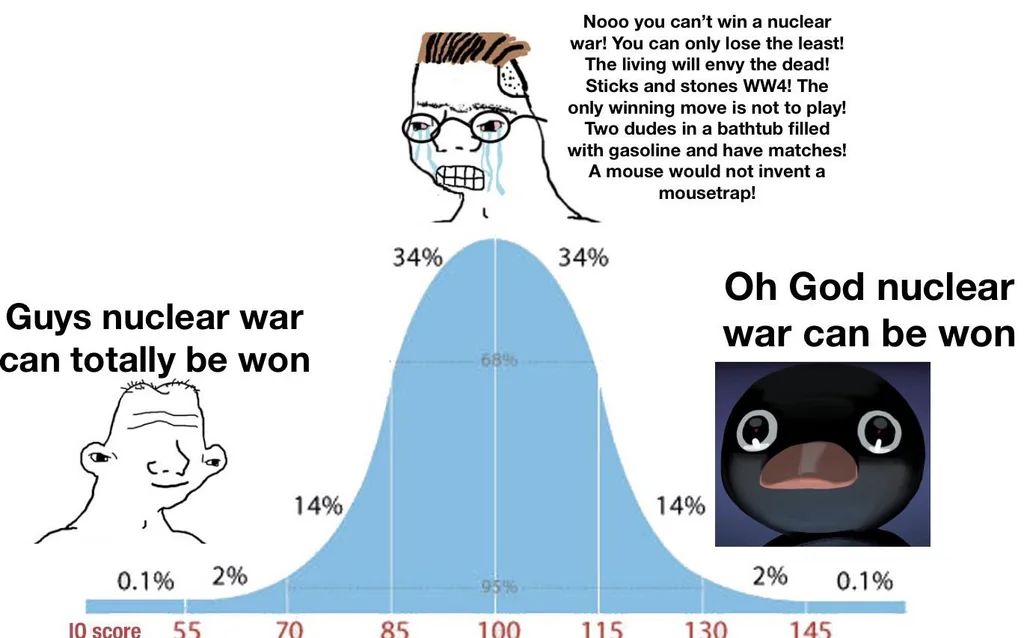this post was submitted on 22 Nov 2024
128 points (97.8% liked)
NonCredibleDefense
3540 readers
186 users here now
Rules:
- Posts must abide by lemmy.world terms and conditions
- No spam or soliciting for money.
- No racism or other bigotry allowed.
- Obviously nothing illegal.
If you see these please report them.
Related communities:
founded 1 year ago
MODERATORS
you are viewing a single comment's thread
view the rest of the comments
view the rest of the comments

Mmm yeah imma small brain here and say it cannot be won. There are nukes on subs traveling all over the ocean. Not to mention that the environmental damage and radiation will probably fuck up the world really bad no matter what. Did you know a single nuke in orbit would emp a whole continent and destabilize climate? Great, now you do
My question is "what does this mean for the nature of empires?" — can they no longer truly fall once they enter the nuclear era? How does civil war look?
That's a bit overblown.
https://en.wikipedia.org/wiki/Starfish_Prime
We've done orbital tests before and while the effects are more than we expected, they are not continent crippling or climate destabilizing.
It's definitely not good, and there's a reason we all agreed not to do that anymore, but it's really more about the damage it does to satellites that hurts everyone, and the damage being too unstructured to be worth investigating too far.
That was before we had microchips in everything, and the internet.
Today, an EMP would have vastly different effects.
If I remember correctly, EMP doesn't really work on very small devices. You need a "antenna" that is long enough to induce a strong enough current to fry your electronics. So anything connected to a long wire. The power grid is itself a huge antenna and will be completely destroyed but a small battery powered device will be unharmed.
When the power grid is down now, phones are down, the internet is down, mobile networks are down, payment systems and ATMs are down, gas stations are down, refrigeration is down, etc. etc.
Basically, 3 days later civilization is down, irreversably.
We actually have extensive electrical backups for almost all of those things. The landline phone system was built in an era where people were significantly more concerned with nuclear war than we are now, so it would fare pretty well.
Home Internet would be down, but the actual data centers all have multiple backups for power.
The cell system would kick most people off, but it also has a lot of backup power built into it because it's viewed as an important part of disaster response in the modern world. Part of the reason it sheds load is to keep capacity available for emergency response.
Don't get me wrong, it would be super bad, more disruptive than a typical or even atypical power outage, and last a long time, but it wouldn't irreversibly take out civilization.
Lots of our battery powered devices have a bunch of literal antennas, though. I actually don't know the frequency ranges on which an EMP can be expected to "pump out" significant amounts of energy, but if there's enough in the bands where WiFi, Bluetooth, GPS etc operate that's going to fry devices that don't have some sort of protection built in. I also have no clue how common it is for radio modules used in consumer stuff to protect against voltage surges on their antennas, but somehow I'd imagine it's not very common.
EMP works a little different. It doesn't emit energy in a frequency in the sense that WiFi uses a frequency.
A changing electric field creates a magnetic field, and a changing magnetic field creates an electrical field. An electrical field makes charged particles move, and electrons move very easily in metal wire, so we get measurable current flow. This is ultimately the principle behind how generators work.
What an EMP does is basically turn any conductive material it hits into part of a very short lived generator. The bigger the conductor, the bigger the current. If something is big enough, it can generate enough current to damage itself, depending on how big or fragile it is.
A lot of small electronics have antenna, but they're very small, so they don't generate much current. If that current would be enough to overcome the voltage protection the devices have to protect against the voltage surge from nearby lightning or the like is beyond me.